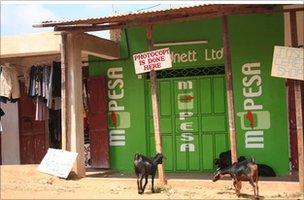Mobile money: Here at last
- Published
- comments
Watch: Rory Cellan-Jones demonstrates how it can work
From today, when you want to buy a coffee or a sandwich, instead of reaching for coins or a credit card you can just brandish your phone.
The mobile wallet has arrived in Britain, in the form of a Samsung phone and a joint venture between Barclaycard and Orange.
Amazing, huh? Well, not really. While the new phone, using near field communication technology (NFC) to allow contactless payments, is a real step forward, what's surprising is just how long it has taken to happen.
Mobile money is the revolution that has been just over the horizon for more than a decade. In 1999 I went to see Nokia in Helsinki.
Amongst the things they were keen to demonstrate, were various ways you could pay with your phone, including a car-wash and a drinks vending machine. The payments system was crude - it involved sending an SMS - but we were assured this was just the beginning and soon our sim cards would become our credit cards.
But we waited - and waited, and apart from a few clunky systems such as phoning up to pay for parking, nothing happened.
There was a pilot scheme a few years back, external involving O2, London's Oyster travel card system and some sandwich bars, but that came and went.

M-Pesa is used by thousands of people every day in Kenya
The technology - NFC, external - had arrived, but it seemed there was not really the will from the mobile operators, the manufacturers, and the banks to come together and convince consumers that this was something they needed.
Meanwhile, the mobile money revolution was happening - in Africa. Travel to Kenya, and on every street you will see shops and kiosks offering the mobile money transfer service M-Pesa.
In a country where only a minority have bank accounts, the idea that you can transfer money to friends or relatives hundreds of miles away without climbing aboard a bus has proved a huge hit. It isn't very high tech - at least not in terms of what happens on the handsets - but it's definitely turned Kenyans' phones into mobile wallets.
Now that idea is coming to the UK, albeit in quite a limited form for now. On the Orange Barclaycard phones you will only be able to spend a maximum of £15 a time, so you're unlikely to decide you can afford to leave your credit cards behind when you leave home in the morning.
But other operators will follow Orange, and once NFC becomes a standard feature of new phones, it's possible that mobile payments will become commonplace too.
What we cannot know at this stage is whether consumers will be keen to see their phones as wallets. In Africa, the service meets a real need and millions have leapfrogged straight from cash to mobile currency without ever being conventional banking customers, writing cheques or using cards to get money out of a cash machine.
Here in the UK, mobile money looks like a useful addition to the way we handle our finances, rather than a necessity. Maybe we will all be buying a cappuccino with a swipe of our NFC phones in a few months, but don't expect the revolution that we've seen in Africa.
- Published29 April 2011

- Published27 October 2010
- Published22 November 2010